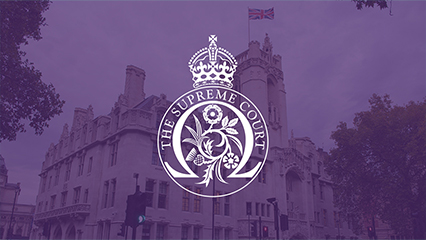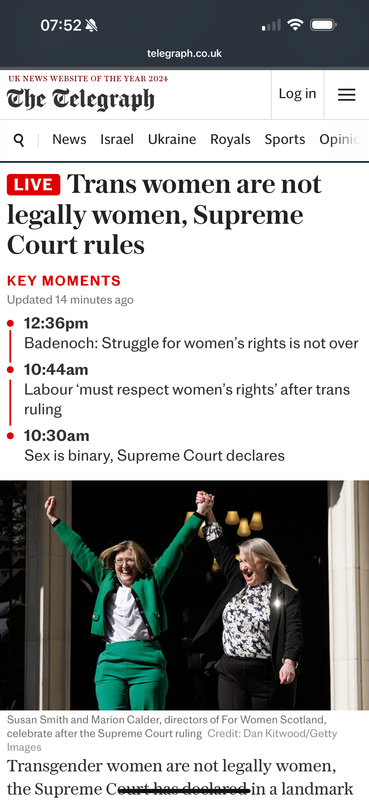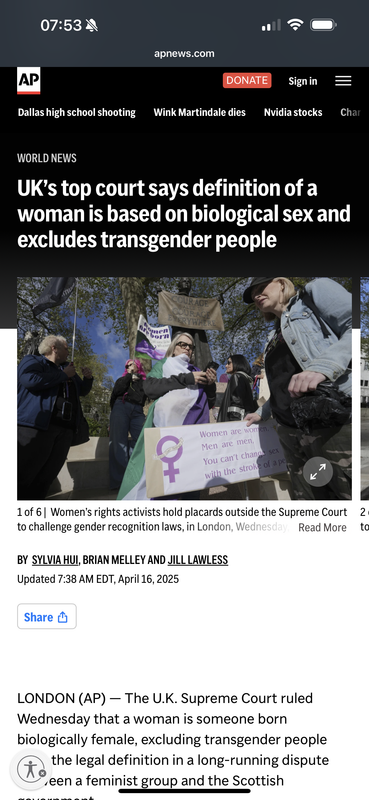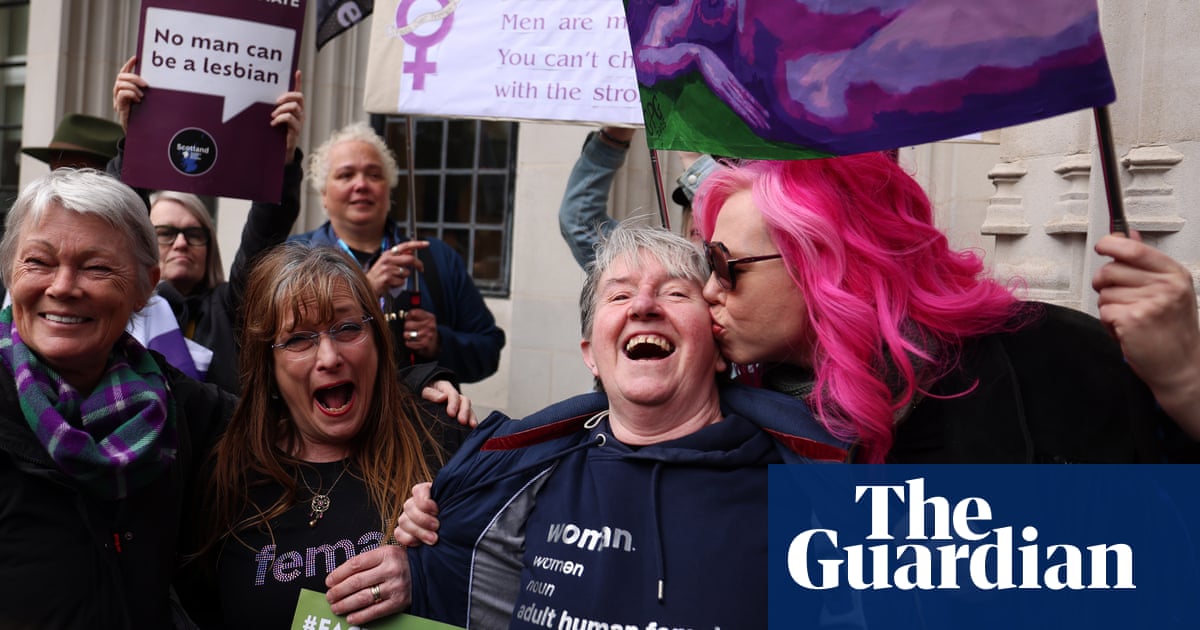Judges rule that Equality Act definition excludes transgender women holding gender recognition certificates

www.theguardian.com
Gender critical campaigners win at UK supreme court over definition of woman
Judges rule that Equality Act definition excludes transgender women holding gender recognition certificates
Severin Carrell
UK supreme court rules definition of woman in Equality Act refers to ‘a biological woman’ – video
Gender critical rights campaigners have won their
supreme court challenge over the definition of a woman.
Five judges from the UK supreme court ruled unanimously that the
legal definition of a woman in the Equality Act 2010 did not include transgender women who hold gender recognition certificates (GRCs).
In a significant defeat for the Scottish government, their decision will mean that transgender women can no longer sit on public boards in places set aside for women.
It could have far wider ramifications by
leading to much greater restrictions on the rights of transgender women to use services and spaces reserved for women, and spark calls for the UK’s laws on gender recognition to be rewritten.
Lord Hodge told the court the Equality Act (EA) was very clear that its provisions dealt with biological sex at birth, and not with a person’s acquired gender, regardless of whether they held a gender recognition certificate.
That affected policy-making on gender in sports and the armed services, hospitals, as well as women-only charities, and access to changing rooms and women-only spaces, he said.
In a verbal summary of the decision, he said: “
Interpreting sex as certificated sex would cut across the definitions of man and woman in the EA and thus the protected characteristic of sex in an incoherent way. It would create heterogeneous groupings.
“As a matter of ordinary language, the provisions relating to sex discrimination, and especially those relating to pregnancy and maternity and to protection from risks specifically affecting women,
can only be interpreted as referring to biological sex.”
Trans rights campaigners urged trans people and their supporters to remain calm about the decision.
The campaign group Scottish Trans
said on social media: “We’d urge people not to panic – there will be lots of commentary coming out quickly that is likely to deliberately overstate the impact that this decision is going to have on all trans people’s lives. We’ll say more as soon as we’re able to. Please look out for yourselves and each other today.”
Ellie Gomersall, a trans woman in the Scottish Green party, called on the UK government to change the law to entrench full equality for trans people.
Gomersall said: “I’m gutted to see this judgment from the supreme court, which ends 20 years of understanding that transgender people with a gender recognition certificate are able to be, for almost all intents and purposes, recognised legally as our true genders.
“These protections were put in place in 2004 following a ruling by the European court of human rights, meaning today’s ruling undermines the vital human rights of my community to dignity, safety and the right to be respected for who we are.”
The gender critical campaign group For Women Scotland, which is backed financially by
JK Rowling, said the Equality Act’s definition of a woman was limited to people born biologically female.
Maya Forstater, a gender critical activist who helped set up the campaign group Sex Matters, which took part in the supreme court case by supporting For Women
Scotland, said the decision was correct.
“We are delighted that the supreme court has accepted the arguments of For
WomenScotland and rejected the position of the Scottish government. The court has given us the right answer: the protected characteristic of sex – male and female – refers to reality, not to paperwork.”
Hodge, the deputy president of the court, said it believed the position taken by the Scottish government and the Equality and Human Rights Commission that people with gender recognition certificates did qualify as women, while those without did not, created “two sub-groups”.
This would confuse any organisations they were involved with. A public body could not know whether a trans woman did or did not have that certificate because the information was private and confidential.
And allowing trans women the same legal status as biological women could also affect spaces and services designed specifically for lesbians, who had also suffered historical discrimination and abuse.
In part of the ruling that could have sweeping implications for policy-makers in the sports world and sports centres, he said some services and places could “function properly only if sex is interpreted as biological sex”.
“Those provisions include separate spaces and single-sex services, including changing rooms, hostels, medical services, communal accommodation, [and] arise in the operation of provisions relating to single-sex characteristic associations and charities, women’s fair participation in sport, the operation of the public sector equality duty and the armed forces.”
Hodge urged people not to see the decision “as a triumph of one or more groups in our society at the expense of another”. He said all transgender people had clear legal protections under the 2010 act against discrimination and harassment.
Kishwer Falkner, the chair of the Equality and Human Rights Commission, which had intervened in the case to support the Scottish government’s stance, said it would need time to fully interpret the ruling’s implications.
However, the commission was pleased it had dealt with its concerns about the lack of clarity around single-sex and lesbian-only spaces.
“We are pleased that this judgment addresses several of the difficulties we highlighted in our submission to the court, including the challenges faced by those seeking to maintain single-sex spaces, and the rights of same-sex attracted persons to form associations.”
@A-dotty @Adeptus Astartes @dora_da_destroyer @Rekkapryde @Neo. The Only. The One. @the cac mamba @Uachet @Absolut @Sterling Archer @TheDarkCloud @Max Power


















